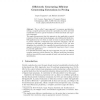Free Online Productivity Tools
i2Speak
i2Symbol
i2OCR
iTex2Img
iWeb2Print
iWeb2Shot
i2Type
iPdf2Split
iPdf2Merge
i2Bopomofo
i2Arabic
i2Style
i2Image
i2PDF
iLatex2Rtf
Sci2ools
129
click to vote
DAGSTUHL
1996
1996
Efficiently Generating Efficient Generating Extensions in Prolog
The so called "cogen approach" to program specialisation, writing a compiler generator instead of a specialiser, has been used with considerable success in partial evaluation of both functional and imperative languages. This paper demonstrates that this approach is also applicable to partial evaluation of logic programming languages, also called partial deduction. Self-application has not been as much in focus in partial deduction as in partial evaluation of functional and imperative languages, and the attempts to self-apply partial deduction systems have, of yet, not been altogether that successful. So, especially for partial deduction, the cogen approach could prove to have a considerable importance when it comes to practical applications. It is demonstrated that using the cogen approach one gets very efficient compiler generators which generate very efficient generating extensions which in turn yield (for some examples at least) very good and non-trivial specialisation.
Related Content
| Added | 02 Nov 2010 |
| Updated | 02 Nov 2010 |
| Type | Conference |
| Year | 1996 |
| Where | DAGSTUHL |
| Authors | Jesper Jørgensen, Michael Leuschel |
Comments (0)

